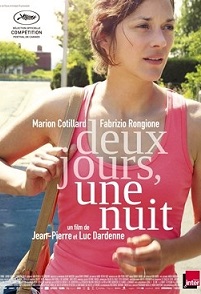♣♣♣♣/♣♣♣♣♣
Raising
a family in a small town in Belgium, Sandra (Marion Cotillard) and husband Manu
(Fabrizio Rongione) both have to work to make ends meet. She takes a short
period of leave due to her depression; an ultimatum welcomes her return to the
office. Her absence meant some adjustments in terms of working overtime for her
co-workers, making them realize that they could actually do the work without
her. The management decides to put the matter to a vote: either they keep
Sandra, or they let her go in lieu of 1000 euros each as a bonus for all of
them. The odds seem to be overwhelmingly against her, but her husband and
friends think that she should not give up. And so she makes it a point to visit
each and every one of her co-workers over the weekend so as to persuade them to vote for her so
she can keep her job. She faces an uphill climb, though, as giving up 1000
euros is not something everyone has the luxury to do.
You
have to give it to Cotillard. She was virtually an unknown in Hollywood before
La Môme came out. Audrey Tautou is at least even more recognizable because of
The Da Vinci Code. And yet here we have Marion, getting Hollywood projects left
and right while maintaining her presence in European cinema. Even her English
has improved a lot, and she is one of only a few European actors who managed to
stay relevant across the pond after their Oscar wins. This is why when she gets nominated for a second time, you should pay attention. Although one might argue that the nomination
is already the win, you could not really ignore the gravitas of her performance
in this movie, especially if you compare it to her rendition of Edith Piaf.
Still
on Cotillard, she was awesome in La Môme, but you might have to agree when I
say that she relied more on theatrics and make-up for that role. It was
something that she could not have done alone. It had to be a team effort for
her performance to soar to greater heights, which is a requisite for playing
such roles. Her turn as a depressed housewife fighting for her labor rights in
this film is just far from her turn as Edith Piaf. Here, she has to be
subtle to be affective. She has to substitute singing with restrained sobbing.
She has to give up the heavy makeup for a more deglamorized look. Perhaps this is why
she got a second nod after all, because she has just proven her
versatility as an actress.
Cotillard
aside, the film captures its audience because of its universal theme. Anyone
who has experienced even just a single workday in his life would know the
feeling of fighting for a job that you might not even like in the first place.
The hardest thing to do in this world is to live in it, and then there are the
other everyday routine and complications that you also have to deal with.
But is it not what makes life worth living after all? Besides, what is life without a challenge? In the end, all you could ever do is survive, because that is what living is all about. All these thoughts and emotions linked to it are prevalent in the movie, and they do not just validate what you already know about life, but also reassure you that you do not have the monopoly of shitty experiences on this planet.
But is it not what makes life worth living after all? Besides, what is life without a challenge? In the end, all you could ever do is survive, because that is what living is all about. All these thoughts and emotions linked to it are prevalent in the movie, and they do not just validate what you already know about life, but also reassure you that you do not have the monopoly of shitty experiences on this planet.
The
twist at the end is mercilessly executed. There you suddenly have a shift in
terms of who holds the power to influence the outcome regarding the film’s primary
dilemma, and in doing so they have given the character a chance to define
not just her place in the workforce, but also her humanity. It is one
of those moments when you realize that the universe has a wicked sense of
humor, and you just learn to ride along because you know the joke would not
always be on you anyway. In fact, you even emerge from the whole ordeal as a stronger person with a more mature sense of being.




_poster.jpg)



0 creature(s) gave a damn:
Post a Comment